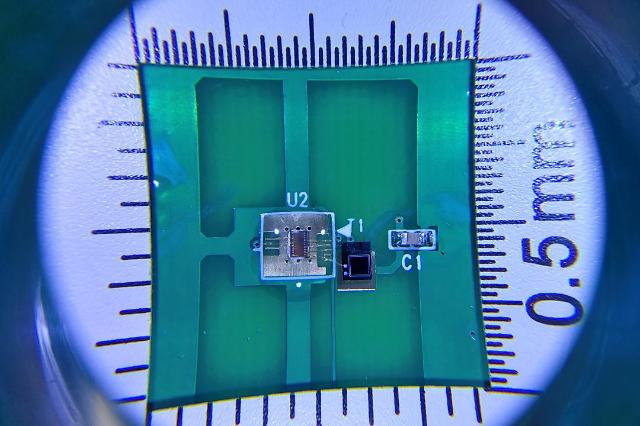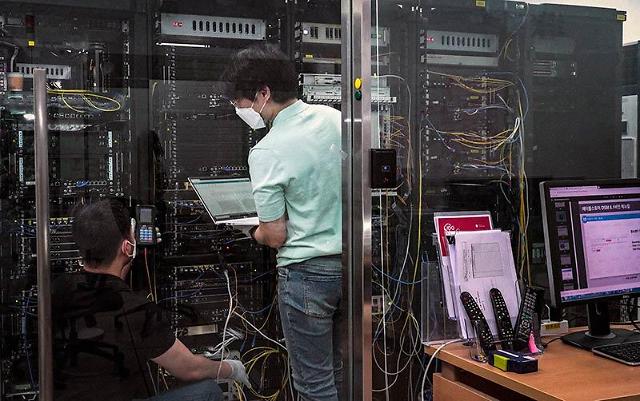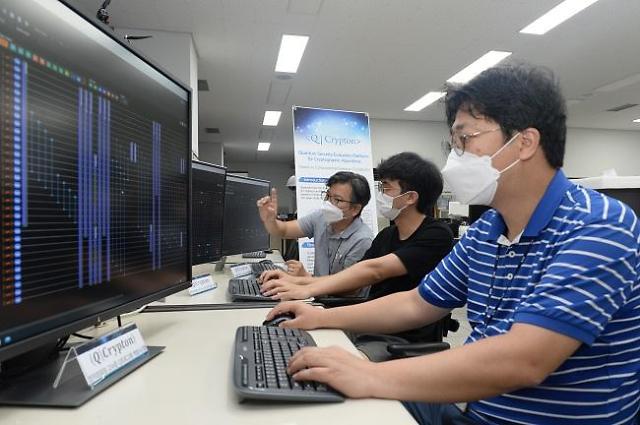
[Courtesy of Korea Atomic Energy Research Institute]
SEOUL -- Researchers from South Korea's two leading state research bodies have developed a core chip for quantum random number generators that provide true random numbers at high speed to fundamentally prevent hacking. They opened the path for commercialization by miniaturizing a beta quantum random number generator into a 1.5mm chip.
A joint research team from the state-run Korea Atomic Energy Research Institute (KAERI) and the Electronics and Telecommunications Research Institute (ETRI) would try to maximize the performance of beta quantum random number generator chips and promote commercialization for use in the cryptographic communication market for small Internet of Things.
Random number generators are used to encrypt information in various fields such as computers and mobile communication. As pseudo-random numbers generated by algorithms without a separate physical device have a weakness that algorithms can be decrypted due to advances in hacking technology, giving way to true random numbers. Beta quantum random number generators can be widely used for private and military IoT as they can dramatically increase security.
"If this technology is commercialized, it will be the ultimate truce random number generator that can be installed in all types of computers, security systems, processors, and IoT modules," ETRI head Kim Myung-joon said in a statement on September 9.
KAERI said that the joint research team has integrated key circuits that generate random numbers from nickel-63 beta rays into the world's "smallest and fastest" beta quantum random number generator that can supply hacking-free random numbers to cryptographic security systems for IoT. Nickel-63 has a low energy beta spectrum and reasonably long half-life.
"The beta-ray quantum random number generation technology developed this time is a good example of creating a new convergence research field by combining nuclear technology and ICT technology," said KAERI President Park Won-seok.
Quantum true random numbers can be obtained by extracting random signals from the quantum mechanical physics phenomenon of a single photon or radiation isotope decay. While random signal extraction using a single photon may be affected by external factors such as temperature, signals extracted from the collapse of radioactive isotopes remain unaffected. Since beta rays have small energy, they can be used constantly without affecting the radiation detection sensor, resulting in the high-speed generation of random numbers, according to KAERI.
The institute said that researchers have miniaturized the core circuits of beta quantum random number generators by applying technologies such as low noise complementary metal oxide semiconductor (CMOS) and thin-film manufacturing that coats a very small amount of nickel-63. To catch the signal of beta rays with small energy, the noise of the semiconductor itself must be reduced. Using low-noise CMOS technology, signal processing circuits can be integrated to reduce the size and minimize noise.
Quantum cryptography is an essential security solution for safeguarding critical information. Data encoded in a quantum state is virtually unhackable without quantum keys which are basically random number tables used to decipher encrypted information. Binary digital electronic computers are based on transistors and capacitors with data encoded into binary digits (bits). Quantum computation uses quantum bits or qubits.
Copyright ⓒ Aju Press All rights reserved.




View more comments